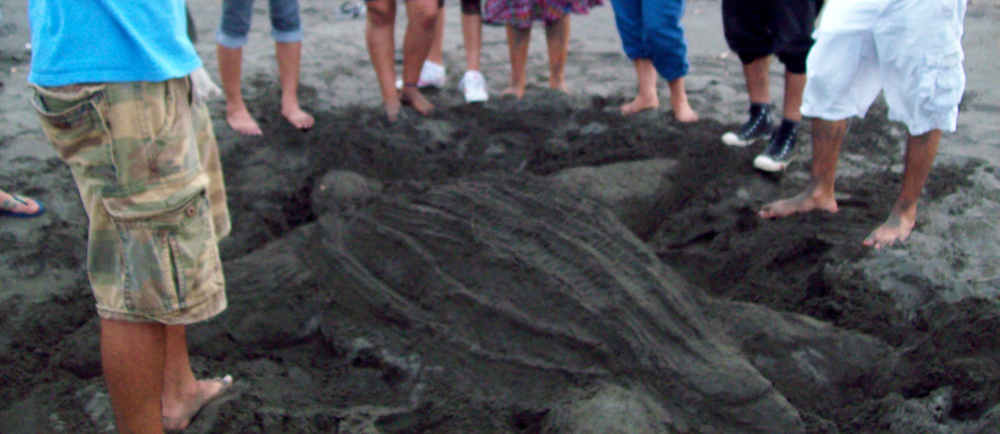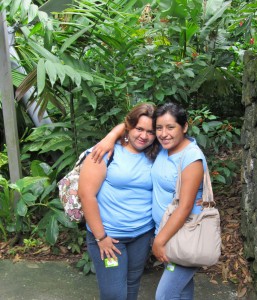EARTH students help save sea turtles
On Saturday, September 22, a group of 14 EARTH students attended the Closing of the Leatherback Turtle Protection Season 2012. The event was organized by Ecology Project International (EPI), a non-profit conservation organization that works with both local and international student groups in Costa Rica and other countries. There, EPI celebrated the EARTH students’ and other volunteers’ commitment to the critically-endangered leatherback sea turtles’ survival.
 This past May, the students spent a week volunteering at the Pacuare Nature Reserve on Costa Rica’s Caribbean shore. As volunteers, they learned hands-on about how to help the species. Patrolling the beach until sunrise, they measured turtles, searched for their well-hidden nests in the sand, counted and ensured the safety of the eggs. Thanks to the EARTH students’ and other volunteers’ direct efforts, turtle birth levels have risen.
This past May, the students spent a week volunteering at the Pacuare Nature Reserve on Costa Rica’s Caribbean shore. As volunteers, they learned hands-on about how to help the species. Patrolling the beach until sunrise, they measured turtles, searched for their well-hidden nests in the sand, counted and ensured the safety of the eggs. Thanks to the EARTH students’ and other volunteers’ direct efforts, turtle birth levels have risen.
The MasterCard Foundation Scholar Astrid Vargas Nina (‘15, Peru), who volunteered, explains that saving the leatherback turtles from extinction will require a lot of combined effort, but it is possible. “Seeing the results shows us that what we’re doing matters,” she says, “which motivates us and inspires us to tell others.”
“It was a marvelous experience,” she continues. “The greatest thing for me was the time we spent with the turtles, when they came out of the sea, and the whole process of seeing the egg-laying, counting the eggs, checking to see if the turtles has been hurt in any way… It’s a tender moment when you see the mother turtle laying the eggs in her nest. Really amazing! From the whole experience, I have lot of great anecdotes, memories and above all, lessons.”
Another student volunteer, The MasterCard Foundation Scholar Betzi Salas Jiménez (‘14, Costa Rica), explains, “It was a privilege to see the turtles. I think the first time you see one it is something incredible, especially if you’ve never seen them before. They’re gigantic – one and a half meters. The leatherbacks are the oldest turtle species, too.”
She appreciates the University’s support for activities such as this one that enrich students’ understanding of biodiversity’s importance. In a powerful way, she says, “It gave us an idea that our career, agronomy, can play a role in protecting animals.”

The MasterCard Foundation Scholars Betzi Salas Jiménez ('15, Costa Rica) and Astrid Nina Vargas ('15, Peru) at the Pacuare Nature Reserve.
“Conservation really has a lot to do with us…” she says. “We can see how the Pacuare River’s pollution affects the ocean. All of the chemicals from unsustainable banana plantations are affecting sea life. What we can do is look for soil conservation methods or other ways of farming that not only conserve our crops and benefit farmers and our families economically, but also conserve wildlife… All of us on the planet are interconnected. We’re learning to make the connections and see that our actions have consequences. And here at EARTH, [agronomy] is not simply all about maximizing production; we’re thinking about it on a global level.”
To that end, the students shared both EARTH’s cultural richness and ecological practices with their peers at the September gathering. They not only gave a Colombian cultural presentation but also highlighted innovative University projects with an educational stand and gave talks on hydroponic agriculture, composting and dry toilets.





La vida de todo ser vivo es muy importante porque cada uno de ellos cumplen una función vital para nuestra existencia y nuestra prolongación de vida por lo tanto hay que cuidarla y conservarla.